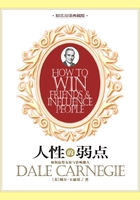
第1章 Fundamental Techniques…(1)
Fundamental Techniques in Handling People
Chapter 1
“If You Want to Gather Honey,Don't Kick Over the Beehive"
On May 7,1931,the most sensational manhunt New York Cityhad ever known had come to its climax.After weeks of search,“Two Gun"Crowley—the killer,the gunman who didn't smoke ordrink—was at bay,trapped in his sweetheart's apartment on WestEnd Avenue.
One hundred and fifty policemen and detectives laid siegeto his top-floor hideway.They chopped holes in the roof;theytried to smoke out Crowley,the“cop killer,"with teargas.Thenthey mounted their machine guns on surrounding buildings,and for more than an hour one of New York's fine residentialareas reverberated with the crack of pistol fire and the rat-tattat of machine guns.Crowley,crouching behind an over-stuffedchair,fired incessantly at the police.Ten thousand excited peoplewatched the battle.Nothing like it ever been seen before on thesidewalks of New York.
When Crowley was captured,Police commissioner E.P.Mulrooney declared that the two-gun desperado was one of the mostdangerous criminals ever encountered in the history of New York.“He will kill,"said the commissioner,“at the drop of a feather."
But how did“Two Gun"Crowley regard himself?We know,because while the police were firing into his apartment,he wrotea letter addressed“To whom it may concern,"And,as he wrote,the blood flowing from his wounds left a crimson trail on thepaper.In this letter Crowley said:“Under my coat is a wearyheart, but a kind one—one that would do nobody any harm."
A short time before this, Crowley had been having a neckingparty with his girl friend on a country road out on Long Island.Suddenly a policeman walked up to the car and said:"Let me seeyour license."
Without saying a word, Crowley drew his gun and cut thepoliceman down with a shower of lead. As the dying officer fell,Crowley leaped out of the car, grabbed the officer's revolver, andfired another bullet into the prostrate body. And that was thekiller who said:"Under my coat is a weary heart, but a kind one—one that would do nobody any harm."
Crowley was sentenced to the electric chair. When he arrived atthe death house in Sing Sing, did he say,"This is what I get for killingpeople"? No, he said:"This is what I get for defending myself."
The point of the story is this:"Two Gun" Crowley didn't blamehimself for anything.
Is that an unusual attitude among criminals? If you think so,listen to this:
“I have spent the best years of my life giving people the lighterpleasures, helping them have a good time, and all I get is abuse,the existence of a hunted man."
That's Al Capone speaking. Yes, America's most notoriousPublic Enemy—the most sinister gang leader who ever shotup Chicago. Capone didn't condemn himself. He actuallyregarded himself as a public benefactor—an unappreciated andmisunderstood public benefactor.
And so did Dutch Schultz before he crumpled up under gangster bullets in Newark. Dutch Schultz, one of New York's most notorious rats, said in a newspaper interview that he was a public benefactor. And he believed it.
I have had some interesting correspondence with Lewis Lawes, who was warden of New York's infamous Sing Sing prison for many years, on this subject, and he declared that"few of the criminals in Sing Sing regard themselves as bad men. They are just as human as you and I. So they rationalize, they explain. They can tell you why they had to crack a safe or be quick on the trigger finger. Most of them attempt by a form of reasoning, fallacious or logical, to justify their antisocial acts even to themselves,consequently stoutly maintaining that they should never havebeen imprisoned at all."
If Al Capone,"Two Gun" Crowley, Dutch Schultz, and thedesperate men and women behind prison walls don't blamethemselves for anything—what about the people with whom youand I come in contact?
John Wanamaker, founder of the stores that bear his name,once confessed:"I learned thirty years ago that it is foolish toscold. I have enough trouble overcoming my own limitationswithout fretting over the fact that God has not seen fit todistribute evenly the gift of intelligence."
Wanamaker learned this lesson early, but I personally hadto blunder through this old world for a third of a century beforeit even began to dawn upon me that ninety-nine times out ofa hundred, people don't criticize themselves for anything, nomatter how wrong it may be.
Criticism is futile because it puts a person on the defensiveand usually makes him strive to justify himself Criticism is dangerous, because it wounds a person's precious pride, hurts hissense of importance, and arouses resentment.
B. F. Skinner, the world-famous psychologist, proved throughhis experiments that an animal rewarded for good behaviorwill learn much more rapidly and retain what it learns far moreeffectively than an animal punished for bad behavior. Later studieshave shown that the same applies to humans. By criticizing, we donot make lasting changes and often incur resentment.
Hans Selye, another great psychologist, said,"As much as wethirst for approval, we dread condemnation."
The resentment that criticism engenders can demoralizeemployees, family members and friends, and still not correct thesituation that has been condemned.
George B. Johnston of Enid, Oklahoma, is the safety coordinator for an engineering company. One of his responsibilities is to see that employees wear their hard hats whenever they are on the jobin the field. He reported that when ever he came across workerswho were not wearing hard hats, he would tell them with a lotof authority of the regulation and that they must comply. As aresult he would get sullen acceptance, and often after he left, theworkers would remove the hats.